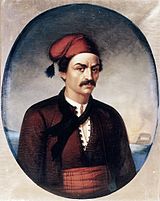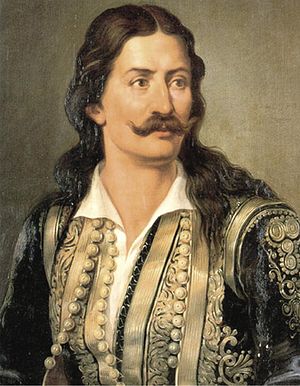Constantine Kanaris
From Wikipedia, the free encyclopedia
Jump to:
navigation,
search
Constantine Kanaris
Κωνσταντίνος Κανάρης

Konstantinos Kanaris (1790-1877)
National Historical Museum of
Athens Prime Minister of Greece
In office
7 June 1877 – 2 September 1877 Monarch
George I Preceded by
Alexandros Koumoundouros Succeeded by
Alexandros Koumoundouros In office
7 August 1864 – 9 February 1865 Preceded by
Zinovios Valvis Succeeded by
Benizelos Rouphos In office
17 March 1864 – 28 April 1864 Preceded by
Dimitrios Voulgaris Succeeded by
Zinovios Valvis In office
28 May 1854 – 29 July 1854 Monarch
Otto Preceded by
Antonios Kriezis Succeeded by
Alexandros Mavrokordatos In office
27 October 1848 – 24 December 1849 Preceded by
Georgios Kountouriotis Succeeded by
Antonios Kriezis In office
11 March 1844 – 11 April 1844 Preceded by
Andreas Metaxas Succeeded by
Alexandros Mavrokordatos Born 1793 or 1795
Parga,
Epirus Died 2 September 1877
Athens,
Greece Nationality
Greek Religion
Orthodox Christian Military service Allegiance
 Kingdom of Greece
Kingdom of Greece Service/branch
Royal Hellenic Navy Years of service 1821–1844 Rank
 Admiral
Admiral Battles/wars
War of Independence Constantine Kanaris (
or Canaris,
Greek:
Κωνσταντίνος Κανάρης) (1793 or 1795 – September 2, 1877) was a
Greek Prime Minister,
admiral and
politician who in his youth was also a
freedom fighter,
pirate,
privateer and merchantman.
[1]
Contents
[
hide]
[edit] Early life


Constantine Kanaris during the Greek War of Independence.
He was born in
Parga, in
Epirus, and grew up on the island of
Psara, close to the island of
Chios, in the
Aegean. His exact year of birth is unknown. The official records of the
Hellenic Navy indicate 1795 but modern Greek historians believe that 1793 is more probable.
Constantine was left an orphan at a young age. Having to support himself, he chose to became a seaman like most members of his family since the beginning of the 18th century. He was hired as a boy on the brig of his uncle Dimitris Bourekas.
His surname 'Kanaris' is actually a nickname. His original name was Konstantinos Nikolaou Spilioteas. The etymology of his nickname could be derived from the Italian word 'Carenaggio' meaning 'shipyard' or 'dockyard'. From the Greek approximation of 'Karnagios' he became 'Kanarios' and finally 'Kanaris'. However, there is more than one theory to how be may have adopted that nickname.
[2]
His father was Nikolaos Spilioteas and his grandfather was Themistocles Spilioteas.
[3][4]
[edit] Military career
Constantine gained his fame during the
Greek War of Independence (1821–1829). Unlike most other prominent figures of the War, he had never been initiated in to the
Filiki Eteria (Friendly Society), which played a significant role in the revolution against the
Ottoman Empire, primarily by secret recruitment of supporters against the Empire.
By early 1821, it had gained enough support to declare a revolution. This declaration seems to have surprised Constantine, who was absent at Odessa. He returned to
Psara in haste and was there when the island joined the Revolution on April 10, 1821.
The island formed its own fleet of ships and the famed seamen of Psara, already known for their successful naval combats against
pirates and their well-equipped ships, proved to be effective at full naval war. Constantine soon distinguished himself as a
fire ship captain.
[5]


The destruction of the Ottoman flagship at
Chios by Kanaris.
Notably at
Chios, where on the night of June 6/June 7, 1822 forces under his command destroyed the flagship of the Turkish admiral Nasuhzade Ali Pasha (or Kara-Ali Pasha) in revenge for the
Chios Massacre. The admiral was holding a celebration, while Kanaris and his men managed to place a fire ship next to it. When the flagship's powder store caught fire, all men aboard were instantly killed. The Ottoman casualties comprised 2000 men, both naval officers and common sailors, as well as Kara-Ali himself.
Constantine led three further successful attacks against the Turkish fleet in 1822–1824. He was famously said to have encouraged himself by murmuring "
Konstantí, you are going to die" every time he was approaching a Turkish warship on the fire boat he was about to detonate.
Egypt was technically a province of the
Ottoman Empire at the time but its viceroy
Mohammad Ali (1769–1849), had earned enough power to act independently from the Sultan and had formed his own army and naval fleet. It was headed by his adoptive son
Ibrahim Pasha (1789–1848). The latter had hired a number of veteran French officers - who had served under Emperor
Napoleon I and were discharged from the French army following his defeat - to help organise the new army. By 1824, it counted 100,000 men and was both better organised and better equipped than the Sultan's army.
Sultan
Mahmud II offered to the viceroy the command of
Crete, if he agreed to send part of this army against the Greeks. They quickly reached an agreement. The Egyptian army, under the personal command of Ibrahim Pasha, started a successful campaign in both land and sea against the relatively ill-equipped, disorganized and outnumbered Greeks.
Among other victories, the Egyptian fleet managed to capture Psara on June 21, 1824. A part of the population managed to flee the island, but those who didn't were either sold into
slavery or slaughtered. The island was deserted and surviving islanders were scattered through what is now Southern Greece.
After the destruction of his home island, Constantine continued to lead his men into attacks with minor successes. Despite them, Ibrahim Pasha would be virtually undefeated until the
Battle of Navarino of October 20, 1827. Then the Turkish-Egyptian fleet was destroyed by the combined naval forces of
Britain,
France and
Russia, that had taken the Greeks under their "protection".
Following the end of the war and the independence of Greece, Constantine became an officer of the new Greek Navy, reaching the rank of Admiral, and later became a prominent politician.
[edit] Political career


Constantine Kanaris (1790-1877); Photographic Archive of Hellenic Literary and Historical Museum, Athens.
Constantine Kanaris was one of the few with the personal confidence of
Ioannis Kapodistrias the first Head of State of independent Greece.
[6] Kanaris served as Minister in various governments and then as
Prime Minister, in the provisional government, from March 11-April 11, 1844. He served a second term (October 27, 1848 – December 24, 1849), and as Navy Minister in Mavrokordatos' 1854 cabinet.
In 1862, he was one of the few War of Independence veterans that helped in the bloodless revolution that deposed King
Otto of Greece and put Prince William of Denmark on the Greek throne as King
George I of Greece. Under George I, he served as a prime minister for a third term (March 17 – April 28, 1864), fourth term (August 7, 1864 – February 9, 1865) and fifth and last term (June 7 – September 14, 1877).
Kanaris died on 2 September 1877 whilst still serving in office as Prime Minister. Following his death his government remained in power until September 14, 1877 without agreeing on a replacement at its head. He was buried in the
First Cemetery of Athens, where most Greek prime ministers and celebrated figures are also buried. After his death he was honored as a national hero.
To honour Kanaris, the Hellenic Navy named, in 18 December 1941, a Hunt III type destroyer after him. The Kanaris L51, the former HMS Hatherleigh, was transferred to Greece from the Royal Navy on July 1, 1972. A destroyer, the
HNS Kanaris (D-212) (formerly USS
Stickell (DD-888)), and on November 29, 2002 a frigate
FFG Kanaris (F 464) (a
Elli (F 450) class frigate) were also named after him.




 Birth name Athanasios Nikolaos Massavetas
Birth name Athanasios Nikolaos Massavetas

 Nickname Nikitaras
Nickname Nikitaras Greece Nikitaras (Greek: Νικηταράς) was the nom de guerre of Nikitas Stamatelopoulos (Greek: Νικήτας Σταματελόπουλος) (1784–1849), a Greek revolutionary who fought for Greece's freedom during the Greek War of Independence. Due to his fighting prowess, he was known as the "Τουρκοφάγος" (Tourkofagos) or Turksbane, literally "Turk-Eater".
Greece Nikitaras (Greek: Νικηταράς) was the nom de guerre of Nikitas Stamatelopoulos (Greek: Νικήτας Σταματελόπουλος) (1784–1849), a Greek revolutionary who fought for Greece's freedom during the Greek War of Independence. Due to his fighting prowess, he was known as the "Τουρκοφάγος" (Tourkofagos) or Turksbane, literally "Turk-Eater".
 Kingdom of Greece Service/branch Royal Hellenic Navy Years of service 1821–1844 Rank
Kingdom of Greece Service/branch Royal Hellenic Navy Years of service 1821–1844 Rank  Admiral Battles/wars War of Independence Constantine Kanaris (or Canaris, Greek: Κωνσταντίνος Κανάρης) (1793 or 1795 – September 2, 1877) was a Greek Prime Minister, admiral and politician who in his youth was also a freedom fighter, pirate, privateer and merchantman.[1]
Admiral Battles/wars War of Independence Constantine Kanaris (or Canaris, Greek: Κωνσταντίνος Κανάρης) (1793 or 1795 – September 2, 1877) was a Greek Prime Minister, admiral and politician who in his youth was also a freedom fighter, pirate, privateer and merchantman.[1]




